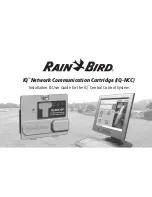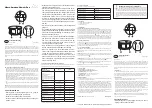
Chapter 1 Smoke control overview
12
BAS-APG001-EN
Underground building smoke control
The smoke control objective for underground buildings is to contain and
remove smoke from the alarm zone. The smoke control system fully
exhausts the alarm zone and provides makeup air to replace the
exhausted air.
Setup and zoning of the smoke detectors is part of the fire alarm system
engineering effort. The fire alarm system signals the smoke control
system to start automatic smoke control operations.
In NFPA 101 (NFPA 2003,
Life Safety Code
), chapter 11.7 states that an
underground building with over 100 occupants must have an automatic
smoke venting system. Chapter 14.3, for new educational occupancies,
provides smoke zoning requirements. Chapter 12.4.3.3 states that
automatic smoke control must be initiated when two smoke detectors in a
smoke zone activate. Chapter 12.4.3.3 states that the system must be
capable of at least 6 air changes per hour.
Smoke detection and system activation
The appropriate smoke detection and system activation approach
depends on the specifics of the smoke control system and on the code
requirements. Automatic activation has the advantage over manual
activation. Automatic activation provides fast and accurate response.
Each smoke control application has detection and activation
requirements:
•
Zoned smoke control
•
Stairwell smoke control
•
Elevator smoke control
•
Atrium smoke exhaust
Note:
Smoke detectors located in HVAC ducts should not be the
primary means of smoke control activation. Duct detectors have
long response times and exhibit degraded reliability when
clogged by airborne particles. However, a duct detector signal
may be used in addition to a primary means of activation. For
more information, refer to Tamura, G.T.,
Smoke Movement &
Control in High-Rise Buildings
.
Summary of Contents for Engineered Smoke Control System
Page 1: ...BAS APG001 EN Applications Guide Engineered Smoke Control System for TRACER SUMMIT ...
Page 2: ......
Page 6: ......
Page 12: ...Contents vi BAS APG001 EN ...
Page 30: ...Chapter 1 Smoke control overview 18 BAS APG001 EN ...
Page 48: ...Chapter 3 Installation diagrams 36 BAS APG001 EN Figure 14 Tracer MP581 to FSCS wiring ...
Page 50: ...Chapter 3 Installation diagrams 38 BAS APG001 EN Figure 15 Tracer MP581 to FACP wiring ...
Page 57: ...Wiring high voltage ac power BAS APG001 EN 45 Figure 19 AC wiring ...
Page 59: ...EMI RFI considerations BAS APG001 EN 47 Figure 20 Checking the earth ground ...
Page 75: ...EMI RFI considerations BAS APG001 EN 63 Figure 31 Checking the earth ground ...
Page 96: ...Chapter 5 Installing the Tracer MP581 programmable controller 84 BAS APG001 EN ...
Page 110: ...Chapter 6 Installing the EX2 expansion module 98 BAS APG001 EN ...
Page 123: ...End process verification BAS APG001 EN 111 Figure 61 ast actuator fail checkb 3 13 06 ...
Page 132: ...Chapter 7 Programming 120 BAS APG001 EN ...
Page 151: ...Understanding bindings BAS APG001 EN 139 Figure 79 Mixed subnet node and group bindings ...
Page 152: ...Chapter 8 Network variable bindings 140 BAS APG001 EN ...
Page 154: ...Appendix A References 142 BAS APG001 EN ...
Page 155: ......
















































